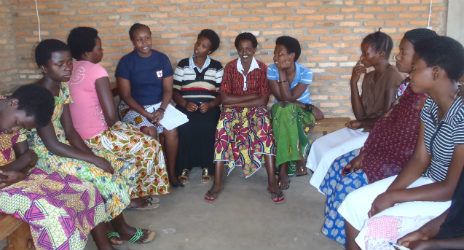The Round-up offers a weekly sample of what our sister Red Cross Societies are working on around the world.
INTERNATIONAL: In recent years, the issue of menstrual hygiene management in post-conflict and post-disaster settings has increasingly drawn the attention of the international humanitarian community. Despite this, menstrual hygiene continues to be overlooked and is still not effectively or comprehensively addressed in emergencies. The IFRC has received a grant from the Humanitarian Innovation Fund to trial menstrual hygiene management kits in three countries in eastern Africa. The kits are designed to enable safe and hygienic management of the menstrual cycle through the provision of disposable or reusable sanitary pads, care and disposal of pads, and practical information. The kits will be complemented by increased and improved training for National Societies, and participatory hygiene promotion tools relating to menstrual hygiene. At least 6,000 women are expected to benefit from the project.
increasingly drawn the attention of the international humanitarian community. Despite this, menstrual hygiene continues to be overlooked and is still not effectively or comprehensively addressed in emergencies. The IFRC has received a grant from the Humanitarian Innovation Fund to trial menstrual hygiene management kits in three countries in eastern Africa. The kits are designed to enable safe and hygienic management of the menstrual cycle through the provision of disposable or reusable sanitary pads, care and disposal of pads, and practical information. The kits will be complemented by increased and improved training for National Societies, and participatory hygiene promotion tools relating to menstrual hygiene. At least 6,000 women are expected to benefit from the project.
CUBA: The people of Santiago de Cuba thought they were going to avoid the worst of Hurricane Sandy, but then on the night of October 25, 2012, they found out that the hurricane was coming straight at them. The government advised people to find shelter, stay calm and remain alert to radio and television reports. Despite these precautionary measures, Sandy was so destructive it wiped out almost everything in its path. The Cuban Red Cross was one of the first humanitarian organizations to respond during the emergency. To date, the National Society has delivered a range of relief items to over 25,000 affected families. The relief items include roofing materials, mattresses, clean drinking water, jerry cans, and hygiene and kitchen kits.
SYRIA: Paying for medicines and medical treatment has become one of the most difficult issues that Syrians face since the crisis began. The local market has been severely affected and many medicines have become prohibitively expensive as most of the pharmaceutical factories have been either destroyed or shut down. The Syrian Arab Red Crescent is trying to ease the situation, with the support of the IFRC. Small pharmacies have been added to many of the shelters through the Red Crescent’s branches and sub-branches in order to assist people directly. The IFRC is supporting the Rural Damascus branch clinic with 600 categories of medicines; the other 350 drugs are bought by the pharmacy at the local market. The Syrian Arab Red Crescent's health activities, including the supply of medicines, are supported by the IFRC and are implemented with contributions from the Canadian Red Cross, Swedish Red Cross, the Humanitarian Aid and Civil Protection department of the European Commission, the U.S. Agency for International Development and the Office of U.S. Foreign Disaster Assistance.
GLOSSARY:
IFRC = International Federation of Red Cross and Red Crescent Societies